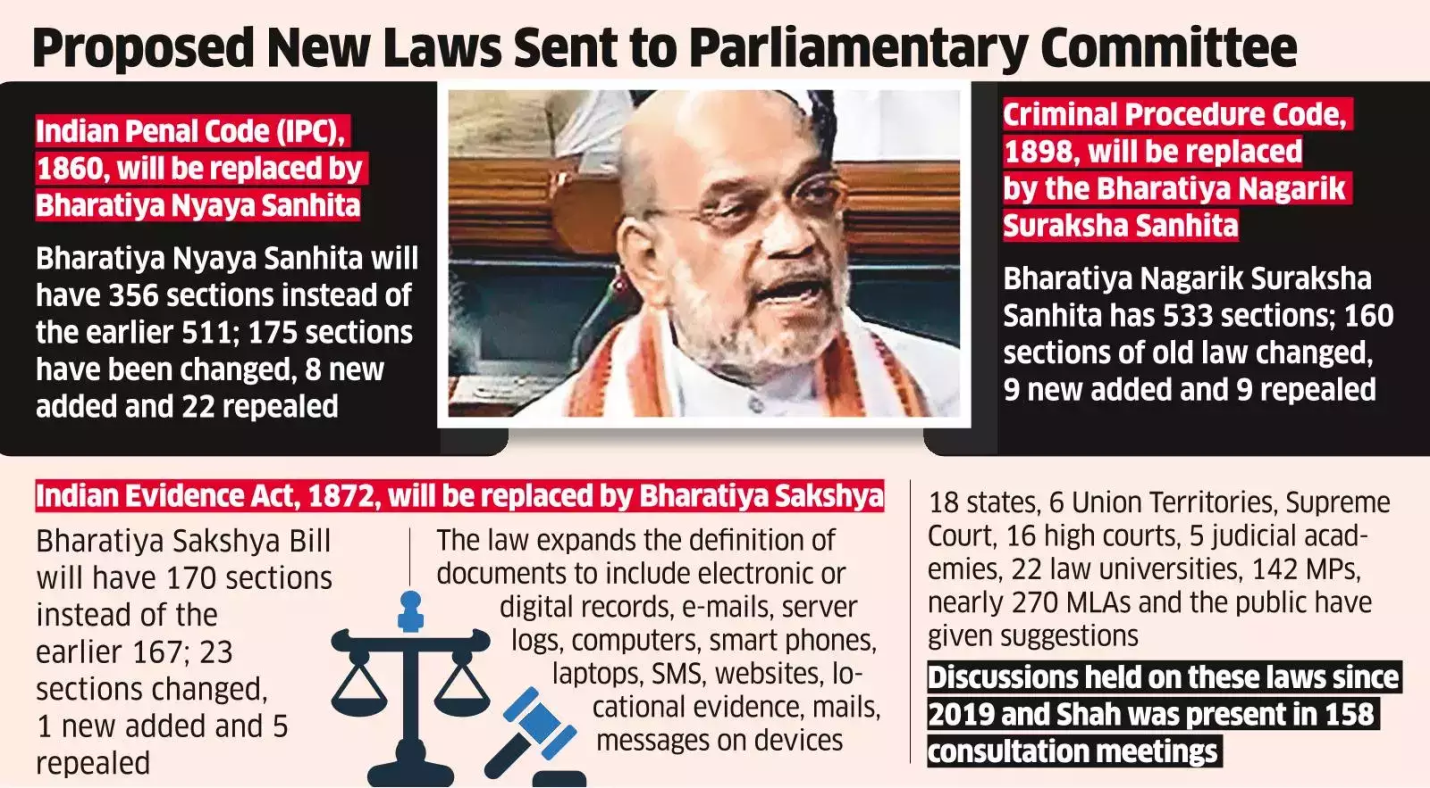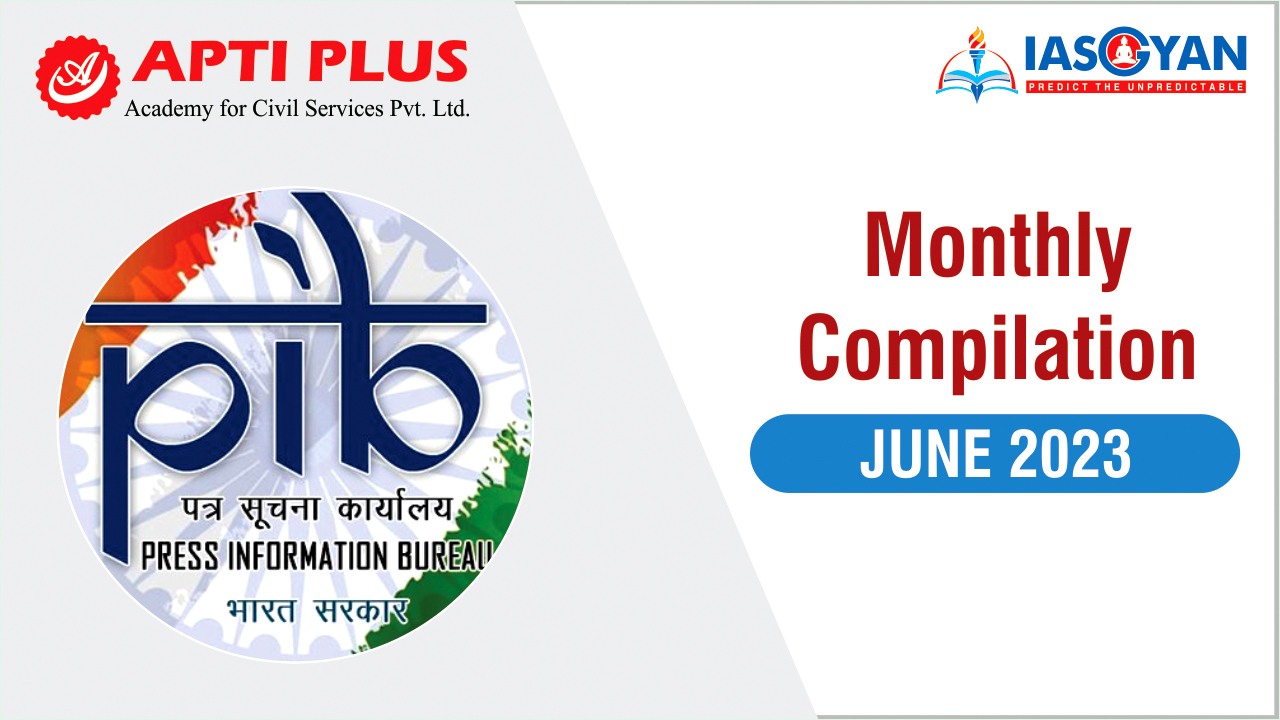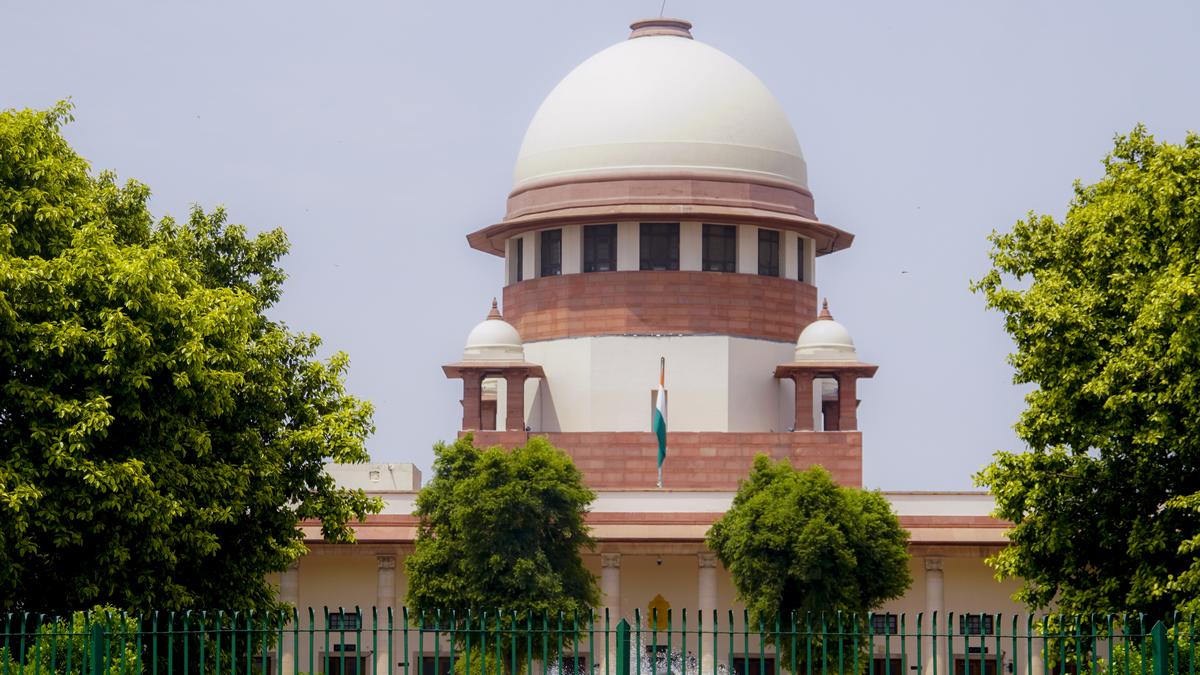Description

Copyright infringement not intended
Picture Courtesy: The Economic Times
Context: The Criminal Procedure Code (CrPC) is the law that regulates the process of criminal justice in India. It has been amended several times since its enactment in 1973. The latest amendment bill, called the Bharatiya Nagarik Suraksha Sanhita, 2023, aims to introduce some significant changes to the CrPC.
Details
Greater use of technology
- The Bill proposes to leverage technology for various aspects of criminal justice, such as conducting trials, appeals, depositions, and recording evidence. It allows for video-conferencing to record the statements of the accused, witnesses, public servants, and police officers. It also enables the transmission of summons, warrants, documents, police reports, and statements of evidence in electronic form.
- The Bill mandates that the search and seizure of articles and properties, the forensic examination of the crime scene, and the recording of the victim’s statement shall be audio-videographed, preferably on a mobile phone.
- The Bill requires that a designated officer in each police station and district shall maintain a register of the name and address of every arrested accused and the nature of the offence. This information shall be “prominently displayed” in both physical and digital modes in every police station and district headquarters.
- The Bill permits the public to send information to the police electronically, and it shall be taken on record after being signed by the sender within three days.
Communication devices
- The proposed legislation introduces a new category of electronic communication, which covers any form of communication that involves the use of devices or digital platforms. This includes text messages, voice calls, emails, social media posts, and video chats.
- The Bill empowers the courts and the police to order a person to produce any document or device that may contain relevant digital evidence for an investigation. This means that a person can be compelled to hand over their phone, laptop, tablet, or any other device that they use to communicate electronically.

Use of handcuffs
- Handcuffs are a type of restraint device that can be used by police officers to secure the wrists of a person who is being arrested. However, the use of handcuffs is not always justified or lawful, and it may depend on the nature and severity of the offence, the risk of escape, and the criminal history of the person.
- According to the bill, a police officer may be allowed to use handcuffs in certain situations, such as when the person is a habitual or repeat offender who has previously escaped from custody, or when the person has committed a serious crime that involves organised crime, terrorism, drugs, weapons, murder, rape, acid attack, counterfeit currency, human trafficking, sexual offence against children or offences against the state.
- These are some of the offences that pose a threat to public safety and national security and may require the use of handcuffs to prevent the person from fleeing or harming others. However, the use of handcuffs should not be arbitrary or excessive, and it should be based on reasonable grounds and evidence.
- The police officer should also respect the dignity and human rights of the person who is being arrested, and avoid causing unnecessary pain or injury. The use of handcuffs should be recorded and reported, and it should be subject to judicial review and oversight.
Specific safeguards
- The proposed amendment to the CrPC aims to prevent arbitrary arrests and protect the rights of the accused. According to the new Section 35, which replaces the old Section 41A, the police officer must obtain prior approval from a senior officer of the rank of deputy SP or above before arresting any person who is charged with an offence punishable with less than three years of imprisonment, or who is above 60 years of age and infirm.
- The police officer must conduct a preliminary inquiry within 14 days to verify the existence of a prima facie case against the person who is charged with an offence punishable with 3-7 years of imprisonment.
Mercy Petitions
- Mercy petitions are a legal option for convicts who face the death penalty. They can appeal to the Governor or the President for clemency within a certain period. The jail authorities must inform the convict, or his legal heir or relative, about the outcome of their petition.
- The convict has 30 days to submit a mercy petition to the Governor after being informed. If the Governor rejects the petition, the convict has another 60 days to appeal to the President. The President's decision is final and cannot be challenged in any court.
Sanction to Prosecute
- The government has a duty to respond to a request for sanction to prosecute a public servant within 120 days of receiving it. Otherwise, the sanction will be automatically granted. This rule does not apply to cases involving sexual offences, trafficking, and other serious crimes, where no sanction is needed to prosecute the public servant.
Arms in Procession
- Section 144A of the CrPC empowers the district magistrate to ban the possession of arms in any procession, mass drill or mass training, to maintain the public order. The provisions that give the DM the authority to issue orders in urgent situations of nuisance or imminent danger are the same as in Section 144 of the CrPC, but the provision to ban the possession of arms is not mentioned there.
Samples without Arrest
- According to the Bill, the magistrate can direct any person to provide samples of his signature, handwriting, voice or finger impressions for investigation without being arrested. This means that the person does not have to be a suspect or an accused in a criminal case to be compelled to give such samples.
- The Bill does not specify the grounds or the conditions under which the magistrate can exercise this power. It also does not mention the consequences or the safeguards for the person who is asked to give such samples.
Detention by Police
- Police have the authority to detain or take away anyone who does not comply with the instructions given to prevent any unlawful or dangerous situation. This is a measure to ensure public safety and order and to protect the rights and freedoms of others. Anyone who resists, refuses or ignores the police directions may face legal consequences and penalties.

Conclusion
- These are some of the major changes proposed in the Bill that could have a significant impact on the criminal justice system in India. The Bill also contains several other provisions related to bail, witness protection, victim compensation, sentencing guidelines, etc. The Bill is expected to face a lot of scrutiny and opposition from various quarters before it becomes law. It remains to be seen how the Bill will balance the interests of justice, efficiency, and human rights in its final form.
Must-Read Articles:
OVERHAUL OF BRITISH-ERA CRIMINAL LAWS: https://www.iasgyan.in/daily-current-affairs/overhaul-of-british-era-criminal-laws
Criminal Procedure (Identification) Bill 2022: https://www.iasgyan.in/daily-current-affairs/criminal-procedure-identification-act-2022
|
PRACTICE QUESTION
Q. What are the key motivations behind the ongoing calls for reforming the criminal justice system in India? In what ways can these reforms significantly impact the efficiency and fairness of the system? What are the major challenges and obstacles hindering the successful implementation of these reforms? What strategies and approaches can be envisioned to navigate these challenges and lead the way forward towards a more just and effective criminal justice system in India?
|
https://indianexpress.com/article/explained/explained-law/key-provisions-and-processes-proposed-in-bill-to-replace-crpc-8888602/
Array
(
[0] => daily-current-affairs/key-provisions-proposed-in-bill-to-replace-crpc
[1] => daily-current-affairs
[2] => key-provisions-proposed-in-bill-to-replace-crpc
)









